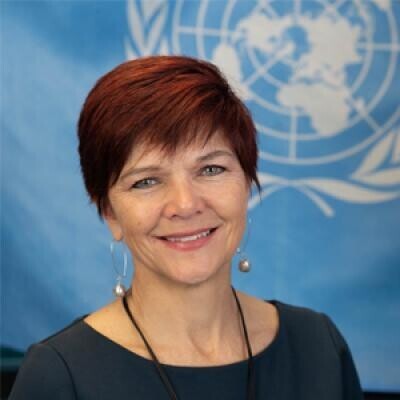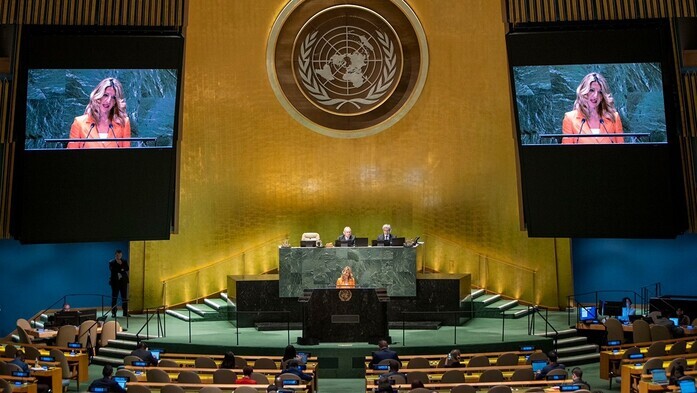hankyoreh
Links to other country sites 다른 나라 사이트 링크
Korea’s social and solidarity economy is “rising star” in global community, says UN expert

“The Korean social and solidarity economy (SSE) is considered a rising star in the international SSE community.”
Chantal Line Carpentier, the chair of the United Nations Task Force on the Social and Solidarity Economy (UNTFSSE), said in a written interview with Hankyoreh Economic and Social Research Institute on May 16 that, since 2000, more than 20 countries around the world, including France and Italy, have adopted laws to support the SSE.
“These efforts will be facilitated by the resolution that adopts an international definition for SSE,” she said.
On April 18 (local time), the UN adopted a resolution on “Promoting the Social and Solidarity Economy for Sustainable Development” at the 66th plenary session of the 77th UN General Assembly.
The resolution encourages the support and strengthening of the SSE as a model for sustainable economic and social development. The SSE, with cooperatives and social enterprises at its core, prioritizes the realization of social value and the interests of community members over profit maximization in all economic activities.
It has been attracting attention as an alternative to solve various social problems such as inequality, the disparity between the rich and the poor, employment insecurity, and environmental destruction in the capitalist market economy, but the COVID-19 crisis has sparked international attention for this model.
The ruling and opposition parties of South Korea are butting heads over a proposal to enact or revise three basic laws of the social economy, including a framework act on the social economy, currently being discussed in the National Assembly.
The opposition parties, including the Democratic Party and the Justice Party, argue that support laws are needed to revitalize the social economy. The ruling party, on the other hand, opposes the law by labeling it a “handout” to the social economy. The UN resolution is not legally binding, but was unanimously adopted by more than 190 member states, including South Korea.
Carpentier, who serves as head of the branch on trade, environment, climate change, and sustainable development at the UNCTAD Division on Trade and Commodities in Geneva, Switzerland, shared that Korea’s SSE is “like K-pop and K-drama, which became a global sensation within a very short time. The global SSE community, especially those SSE actors in the Global South, expect South Korea to play a bigger role in supporting and promoting SSE at the global level.”

Chantal Line Carpentier: The need to raise awareness and visibility and promote the SSE as an alternative way of development that can contribute to inclusive, rights-based and sustainable development within the UN system and beyond was the reason behind the creating of the task force in September 2013. The founding meeting was convened by International Labour Organization, the UN Development Programme, the UN Non-Governmental Liaison Service and UN Research Institute for Social Development, and attended by 14 agencies. Since then the task force has produced, under the leadership of Vic Van Vuuren, important contributions including a position paper on the SSE and the Sustainable Development Goals (SDGs) and an “Encyclopedia of the Social and Solidarity Economy” as well as several symposia and other outreach. Supporting a UN resolution to mainstream and enhance the international dimension of the SSE was one of the priority objectives of the third task force technical symposium. Resolutions are member-states-led so our first task was to identify member states that would have an interest in sponsoring the resolution. The pandemic slowed things down as member states were not meeting face-to-face and negotiations were limited, preventing the introduction of a new resolution. In 2022, Spain expressed interest. The task force supported their effort to recruit one co-facilitators from each UN region and succeeded in rallying Chile and Senegal for Latin America and Africa, respectively.
Hankyoreh: The UN resolution highlighted the role and contribution of SSE in sustainable growth. What are the key points?Carpentier: By encouraging member states to promote and implement national, local, and regional strategies, policies and programs for supporting and enhancing the SSE in various dimensions, the resolution created an enabling environment for the SSE and its contribution to achieving and localizing the SDGs. The resolution also encouraged UN agencies, including UN country teams, to give due consideration to the SSE as a part of their planning and programming instruments such as the UN Sustainable Development Cooperation Framework. Finally, by encouraging multilateral, international and regional financial institutions and development banks to support the SSE including through existing and new financial instruments and mechanisms, the resolution created an excellent opportunity for financing for the SSE, which has been one of the major obstacles to the further development and expansion of the SSE.
Hankyoreh: UNRISD emphasizes that the adoption of the UN resolution marks a historic moment for the SSE community worldwide, why do you think this is?Carpentier: The resolution provided an official definition for the social and solidarity economy and officially acknowledged that the SSE can contribute to the achievement and localization of the Sustainable Development Goals. In doing so, the resolution provided a solid basis to realize the full potential of the SSE for sustainable development across the world. The history of the SSE can be traced back to a form of associationalism based on democratic solidarity in the early 19th century. Despite their significant contribution to the planet’s health, the wellbeing of people, and democratic governance, many of them have not been systematically promoted as a key alternative approach or instrument since they did not have legal recognition, or they were not included in the official statistics. The adoption of the resolution itself was a historic moment because it addressed and solved all these problems.
Hankyoreh: Tell us about the development of SSE around the world. In the EU, there were about 2.8 million SSE organizations in 2017, accounting for about 6.3% of total employment. On the other hand, Korea’s SSE has achieved notable quantitative growth over time, but still only makes up about 1% of employment and has a week legal basis.Carpentier: The figures about the SSE, such as the number of organizations and contributions of the SSE to employment or production have been underestimated. At the December multi-stakeholder meeting on “How can the international recognition of Social and Solidarity Economy (SSE) help achieve the Sustainable Development Goals (SDGs) through social and inclusive innovation?” the Mongolian ambassador to the UN in New York, informed us that worldwide, cooperatives provide 100 million jobs — 20% more than multinational enterprises — ensuring social and inclusive innovation. Marlène Schiappa, France’s minister delegate in charge of citizenship, indicated that SSE companies now represent 10% of French GDP and 14% of jobs.
Hankyoreh: The UN resolution called on all UN member states, UN agencies, and financial institutions to promote and support SSE. What specific efforts do you think are needed?Carpentier: The resolution encourages member states to promote and implement national, local and regional strategies, policies and programs for supporting and enhancing the social and solidarity economy as a possible model for sustainable economic and social development, taking into account national circumstances, plans and priorities by, inter alia, developing specific legal frameworks, where appropriate, for the social and solidarity economy; making visible, when feasible, the contribution of the social and solidarity economy in the compilation of national statistics and providing fiscal and public procurement incentives; acknowledging the social and solidarity economy in education curricula and capacity-building and research initiatives and reinforcing entrepreneurship and business support, including by facilitating access for social and solidarity economy entities to financial services and funding; and encouraging the participation of social and solidarity economy actors in the policymaking process.
Hankyoreh: Korea’s parliament has been pursuing enactment of/revisions to legislation including a framework act on the social economy that would include tax benefits for social enterprises and cooperatives and mandatory purchases by public institutions. What global lessons are there for Korea when it comes to these matters?Carpentier: Since the turn of the century, we can safely say more than 20 countries have adopted legislation on the SSE. They include Argentina, Belgium, Bolivia, Brazil, Cameroun, Canada, Cape Verde, Colombia, Djibouti, Ecuador, France, Honduras, Italy, Luxembourg, Mexico, Portugal, Romania, Senegal, Slovakia, Spain, Tunisia, and Uruguay. These efforts will be facilitated by the resolution that adopts an international definition for SSE.
Hankyoreh: The South Korean government and ruling party oppose the Framework Act on Social Economy, saying it gives preferential treatment to social economy organizations. What do you make of this?Carpentier: I can’t answer this question.
By Kwack Jung-soo, senior staff writer at the Hankyoreh Economic and Social Research Institute
Please direct questions or comments to [english@hani.co.kr]

Editorial・opinion
![[Guest essay] Amending the Constitution is Yoon’s key to leaving office in public’s good graces [Guest essay] Amending the Constitution is Yoon’s key to leaving office in public’s good graces](https://flexible.img.hani.co.kr/flexible/normal/500/300/imgdb/original/2024/0416/8917132552387962.jpg) [Guest essay] Amending the Constitution is Yoon’s key to leaving office in public’s good graces
[Guest essay] Amending the Constitution is Yoon’s key to leaving office in public’s good graces![[Editorial] 10 years on, lessons of Sewol tragedy must never be forgotten [Editorial] 10 years on, lessons of Sewol tragedy must never be forgotten](https://flexible.img.hani.co.kr/flexible/normal/500/300/imgdb/original/2024/0416/8317132536568958.jpg) [Editorial] 10 years on, lessons of Sewol tragedy must never be forgotten
[Editorial] 10 years on, lessons of Sewol tragedy must never be forgotten- [Column] A death blow to Korea’s prosecutor politics
- [Correspondent’s column] The US and the end of Japanese pacifism
- [Guest essay] How Korea turned its trainee doctors into monsters
- [Guest essay] As someone who helped forge Seoul-Moscow ties, their status today troubles me
- [Editorial] Koreans sent a loud and clear message to Yoon
- [Column] In Korea’s midterm elections, it’s time for accountability
- [Guest essay] At only 26, I’ve seen 4 wars in my home of Gaza
- [Column] Syngman Rhee’s bloody legacy in Jeju
Most viewed articles
- 1[Guest essay] Amending the Constitution is Yoon’s key to leaving office in public’s good graces
- 2Faith in the power of memory: Why these teens carry yellow ribbons for Sewol
- 3[Editorial] 10 years on, lessons of Sewol tragedy must never be forgotten
- 4[Guest essay] How Korea turned its trainee doctors into monsters
- 5How Samsung’s promises of cutting-edge tech won US semiconductor grants on par with TSMC
- 6US grants Samsung up to $6.4B in subsidies for its chip investments there
- 7[News analysis] Watershed augmentation of US-Japan alliance to put Korea’s diplomacy to the test
- 8Korea ranks among 10 countries going backward on coal power, report shows
- 9[Column] A death blow to Korea’s prosecutor politics
- 10K-pop a major contributor to boom in physical album sales worldwide, says IFPI analyst